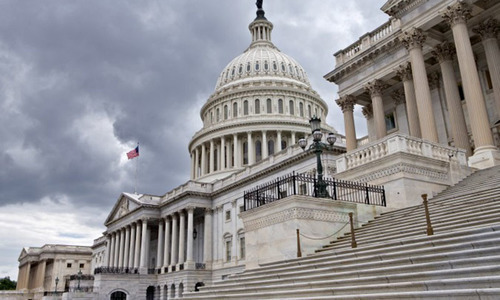WASHINGTON: The US Senate has passed its draft of the National Defence Authorisation Bill, including a provision to set up a new fund to reimburse Pakistan for its efforts in the war against terrorism.
The Senate version authorises $800 million under a provision called the `Pakistan Security Enhancement Authorisation’.
It also fences $300m behind a similar Haqqani network provision that has existed in the annual defence authorisation acts since the fiscal year 2015.
The proposal for Pakistan was passed as originally initiated.
None of the over 400 amendments considered by the Senate targeted this outlay for Pakistan.
The proposed reimbursement mechanism for Pakistan replaces the Coalition Support Fund (CSF), which was used to reimburse both Afghanistan and Pakistan for their efforts to combat terrorism.
Pakistan has received a total of $3.1 billion since 2013 under the CSF. But this fund expires in the current financial year, ending in October.
The US administration is allowing the CSF to expire because it was linked with a specific US mission in Afghanistan, which has formally ended.
While adopting the new provision, the Senate Armed Services Committee used the CSF model to restructure security support for Pakistan. But it focuses specifically on Pakistan’s own security needs instead of tying it to a broader coalition.
In doing so, the new provision delinks Pakistan from Afghanistan, by recognising it as a country with its own strategic value for US interests.
In a report filed with the draft Defence Bill, the US Senate Armed Services Committee called Pakistan "a long-standing strategic partner" and stressed the need to continue a strong relationship with the country.
The committee also noted that since 9/11 Pakistan has been a vital partner of the US in efforts to combat terrorism in South Asia.
Both houses of the Congress have passed their versions of the Defence Bill. A conference committee of both houses will now be formed to develop a consensus draft.
The consensus draft will be passed from both houses of the Congress again before it is sent to the president for signature.
The procedure can be completed by July, although past bills have been passed as late as November.
Senator John McCain, who chairs the Senate Armed Services Committee, had introduced the bill late last month. The committee sent it to the Senate with its approval.
Besides, the Haqqani restriction, the bill requires Pakistan to keep open ground communication lines to Afghanistan for receiving reimbursements from this fund.
Another bill, passed by the House of Representatives last week, linked $450m from a total of $900m proposed for Pakistan to take action against the Haqqani network.
The committee expressed the concern that “continued reliance on Coalition Support Fund for the provision of security assistance to Pakistan could negatively impact US support of Pakistani operations to combat terrorism”.
Published in Dawn, June 16th, 2016














































